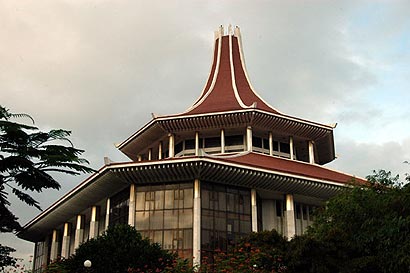Length of President’s term only five years

The Supreme Court has informed President Maithripala Sirisena that his term of office is five years, the President’s Media Division says.
The Supreme Court’s opinion has been conveyed in response to the President seeking its opinion on the length of his term.
On reference made by President Maithripala Sirisena, Chief Justice Priyasath Dep appointed a five-judge bench on January 10, to decide whether the President’s term is five or six years.
The Supreme Court held an open court hearing to decide whether the President’s term is five or six years on January 11.
The matter was taken up before a five-judge-bench comprising Chief Justice Priyasath Dep, Justice Eva Wanasundara, Justice Buwaneka Aluvihare, Justice Sisira de Abrew and Justice K.T. Chitrasiri.
(Source: The Island)
Latest Headlines in Sri Lanka
- Shiranthi Rajapaksa summoned to FCID on February 3, 2026 February 1, 2026
- Sri Lanka PM calls for education reform to strengthen nation February 1, 2026
- Sri Lanka revises fuel prices from February 1, 2026 January 31, 2026
- Sri Lanka declares essential services to ensure recovery after Cyclone Ditwah January 31, 2026
- Sri Lanka disburses Rs. 50,000 relief to 70% of Cyclone Ditwah victims January 31, 2026



Strange that the smart guys cannot interpret the existing constitution without referring to the courts. The court can do nothing more than interpret the constitution and resolve any contradiction.
Mr sirirsena could contest the enxt prsidential election and if wins then constitutional he can exercise powers vested constitutionally.
There must be constitutional procedure to change what is in the constitution. The party manifesto does not give the right to invoke constitutional reform. UNP nor the SLFp were did not command even a simple majority to govern yet alone a 75 percent majority to give them the right to address a constitutional reform. Since there are several elections to come and many parties contesting each party will produce a `manifesto” and obvious there will no doubt be clauses related to the constitution.
The provincial governments were constituted following the peace accord of 1982and there is much to be desired as to how the provincial goverments are constituted. Th e basic premises on which the provincial goverbnents are assembled is flawed. If the members to the provincial governments are elected democartically the the governers ought to be elected by those elected or an governors election ought to be run concurrently and not a nominee of the government
Pipe dream shattered!!
What about amending the constitution?